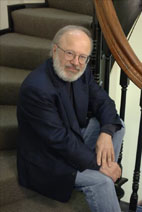Annas Takes on Genetic Testing Guidelines: ‘Respect Patients’ Rights Not to Know’.
Should patients whose genes are analyzed for a particular medical condition be automatically tested for a host of other possible conditions – and told about those secondary results?
The American College of Medical Genetics and Genomics (ACMG) has said “yes” to this question in a policy recommendation advanced in March. But BU School of Public Health Professor George Annas and two other experts in law and medicine counter with a definite “no,” in a paper published online Thursday in the journal Science.
“Patients have an established right to refuse unwanted medical tests and the information they might disclose,” Annas and his co-authors said. “Starting down the path of unconsented testing and reporting in clinical genomics leads to grave difficulties, and should not be done without more careful analysis. . . The ACMG should reconsider this policy statement.”
Annas and two colleagues – Professor Susan M. Wolf of the University of Minnesota, and Dr. Sherman Elias of the Feinberg School of Medicine at Northwestern University – were reacting to a set of recommendations adopted by the ACMG that calls for doctors who sequence a patient’s genes for any medical reason to look for two dozen unrelated genetic conditions and tell the patient if they find any of them. The guidelines have stirred controversy among bioethicists and physicians, with some praising them as an important first step in establishing ground rules for genetic sequencing, and others criticizing them as stomping on patients’ rights.
 George AnnasAdvances in genome sequencing have led to a rapid expansion of clinical applications to aid diagnosis and treatment. Debate over the pros and cons of genetic predictive testing was amplified this week by actress Angelina Jolie’s disclosure that she had a prophylactic double mastectomy after testing positive for a breast-cancer gene mutation.
George AnnasAdvances in genome sequencing have led to a rapid expansion of clinical applications to aid diagnosis and treatment. Debate over the pros and cons of genetic predictive testing was amplified this week by actress Angelina Jolie’s disclosure that she had a prophylactic double mastectomy after testing positive for a breast-cancer gene mutation.
In their Science commentary, Annas and his co-authors say the recommendation that clinicians report the test results of “incidental findings” in 57 genes specified by the ACMG – with “no opportunity for the patient to decline unwanted information” – poses “profound” ethical and legal problems. The only choice the patient has is to decline genetic sequencing altogether, even if medically indicated, they said.
“Rejecting the need for the patient’s informed consent to look for mutations in a predetermined list of 57 genes is a profound departure from prevailing laws and norms,” they wrote. “Informed consent is a well-established legal requirement designed to protect patient autonomy – not a matter susceptible to modification by experts in human genetics, no matter how learned.”
Annas, Wolf and Elias argue that giving patients “unwanted information” carries its own risks, including anxiety, further clinical testing and potentially burdensome medical interventions.
The co-authors also opposed the ACMG’s inclusion of children in the recommendations, saying it runs counter to a longstanding consensus that predictive testing for adult-onset diseases not be undertaken or disclosed to parents or children. “Delaying testing and return of genetic information not medically useful in childhood allows the child to reach adulthood and then make a choice, based on his or her own values,” they said.
Annas and colleagues also questioned how the ACMG’s list of genes to be tested was compiled, saying the selection of 57 genes – most related to risks for cancer, cardiovascular disease and adverse reactions to anesthetics – “appears arbitrary.” The ACMG has said it focused only on conditions where the knowledge of having a particular gene could be used to medically intervene and help the patient.
“If the ACMG was trying to justify required search and disclosure of incidental findings without patient consent, the criteria should have been considerably more stringent, such as significant likelihood of substantial harm in the near future if not communicated,” they wrote.
The full article is available at: http://www.sciencexpress.org
Submitted by: Lisa Chedekel chedekel@bu.edu